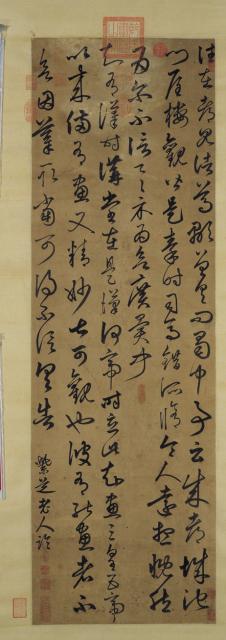元俞和臨王帖 軸
推薦分享
資源連結
連結到原始資料 (您即將開啟新視窗離開本站)後設資料
- 資料識別:
- 故書000006N000000000
- 資料類型:
- 類型:書法
- 型式:文字
- 著作者:
- 俞和
- 出版者:
- 數位化執行單位:國立故宮博物院
- 格式:
- 本幅 113.1x35.3公分、全幅 56.8公分
- 語言:
- 漢文
- 關聯:
- 石渠寶笈初編(御書房),下冊,頁1093&*俞和,字子中,號紫芝生,暮年稱紫芝老人,浙江杭州人。生卒年不詳,至正二十三年(一三六三)尚在。性沖澹安恬,隱居不仕,能詩,喜書翰。嘗廣臨晉唐諸帖,功力極深。早年得見趙孟頫運筆之法,行草書逼真文敏,好事者得其書,每用趙款識,倉卒莫能辨。其書時以為與宋克齊名。明桑悅評其書謂「深得松雪筆意,而圭角稍露,比之於雪,正如獻之之於羲之也。」&*Yü Ho (style-name Tzu-chung and sobriquet Tzu-chih-sheng) was a native of Hangchou, Chekiang. A quiet, unassuming person, he lived in retreat and did not serve at court. An able poet, he was also fond of calligraphy and produced superb copies of Chin (4th c.) and T'ang (618-907) writings. As a young man he actually had occasions to watch Chao Meng-fu (1254-1322) do calligraphy, and Yü was able to brilliantly emulate Chao's running and grass scripts. Someone consequently signed Chao's name to these works, so today their precise authorship is uncertain. Yü is sometimes considered as famous as his contemporary, Sung K'o. The Ming calligrapher Sung Yüeh (1447-1513) said of Yü that "He has a profound understanding of Chao Meng-fu's handling of ink, but his own style has somewhat fuller angles. Yü can be compared to Chao in the same way that Wang Hsien-chih (344-386) can be compared to his father, Hsi-chih (ca. 307-ca. 365)."
- 管理權:
- 國立故宮博物院
授權聯絡窗口
- 國立故宮博物院圖像授權、出版授權、影音資料授權-申請流程說明
http://www.npm.gov.tw/zh-TW/Article.aspx?sNo=03003061






